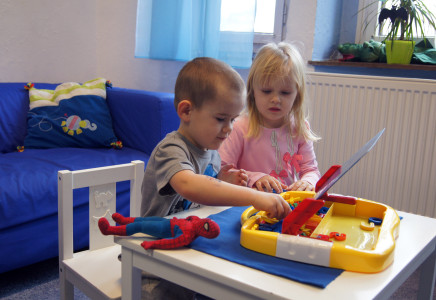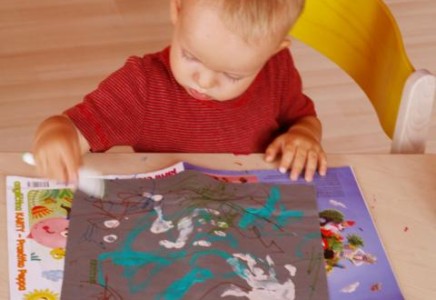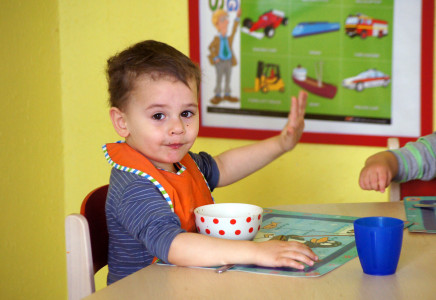About us
International English-Czech Kindergarten
Penguin’s Kindergarten is a private school accredited by the Ministry of Education and listed in the register of schools and other educational institutions. In 2013, the procedures and teaching in our school were successfully evaluated by the Czech School Inspectorate.
Penguin’s Kindergarten is to be found in a homely and pleasant premises in Frydek-Mistek, Tesinska Street. Come visit us and we’ll be happy to welcome you and your children. The premises are beautiful, bright and spacious. They have been designed by experts to comply with all sanitary standards and parameters.  Our total capacity is 20 children and we accept children aged 2-6. As a parent, you are welcome in the nursery school at any time during the day, so you can watch your child play and learn, or you can take part in any activity.
Our total capacity is 20 children and we accept children aged 2-6. As a parent, you are welcome in the nursery school at any time during the day, so you can watch your child play and learn, or you can take part in any activity.
Penguin’s Kindergarten is open all year round, Monday to Friday, 7.30 a.m. – 5.00 p.m., for you.
We emphasise the development of the child, his or her satisfaction and the appreciation of values such as love and family. We also respect the educational styles of parents. Our little penguins can look forward to fun and games, along with healthy development and education. In addition, interacting with native speakers will naturally help them learn English. Your child will look forward to going to school. We are the first international Kindergarten in the Czech Republic to have established cooperation with a Kindergarten in New Zealand. We looked through their curricula and training programmes and chose inspiring elements which the Czech preschool education system was lacking, but which little penguins will definitely enjoy. Last but not least, thanks to this partnership, we can guarantee a high level of teaching English, as our children come into regular contact with native speakers.
Penguin’s Kindergarten loves children. We treat everyone with love, and individually and sensitively adapt to the level of their maturity and skills. Our learning environment and programmes meet all the needs of children, and promote healthy development in terms of physical, emotional, intellectual and social aspects. We celebrate childhood and respect children and their unique personalities.  We encourage children to find their own natural authority, confidence and positive self-evaluation, but also to respect other cultures and different approaches to life. In all activities, we try to teach children attitudes that respect their own health and practical skills for protecting the good health of everyone. We reinforce physical fitness and agility. We instil in the children the importance of taking care of their health. We cultivate a positive relationship with the environment by including activities that help them acquire basic knowledge about nature and its conservation. We lead the children towards all-round physical, mental, social and spiritual development, so that later, as adults, they can enjoy a full and meaningful life and act according to democratic principles of coexistence in the society. Children are a great joy – we need to listen to them, love them and show them the right path in life in a natural and spontaneous way! Learning even the most complex things can be done by playing and having fun.
We encourage children to find their own natural authority, confidence and positive self-evaluation, but also to respect other cultures and different approaches to life. In all activities, we try to teach children attitudes that respect their own health and practical skills for protecting the good health of everyone. We reinforce physical fitness and agility. We instil in the children the importance of taking care of their health. We cultivate a positive relationship with the environment by including activities that help them acquire basic knowledge about nature and its conservation. We lead the children towards all-round physical, mental, social and spiritual development, so that later, as adults, they can enjoy a full and meaningful life and act according to democratic principles of coexistence in the society. Children are a great joy – we need to listen to them, love them and show them the right path in life in a natural and spontaneous way! Learning even the most complex things can be done by playing and having fun.
A penguin’s day is varied and inspiring. We have compiled a programme which emphasises all-round development, focusing primarily on games, creativity and the free expression of children. Children will learn basic skills, such as how to perform well in relation to others, how to enter games, how to be successful, how to make or refuse contact, how to communicate wishes or consent, how to help someone, how to follow one time and lead the next, how to adapt and control, how to deal with aggression, how to get to know others, how to evaluate expressions and find their own identity.
Our children attend mixed classes – we do not divide them by age (we only divide them into smaller working groups). We rely on the former tradition of large families, where children of different ages used to spend time together, thus creating social bonds of mutual assistance and motivation, and getting accustomed to the needs of the others. Today’s small families cannot give children plenty of opportunities to gain similar experience as in the days when three or four generations lived together, and the number of siblings was higher. Mixed classes create conditions for the natural socialization of children. The greater the age difference between the children, the richer and more diverse the contact between them, the more social roles and strategies they can adopt, and the more opportunities they have for natural imitation and the development of language and communication.
Mixed classes create conditions for the natural socialization of children. The greater the age difference between the children, the richer and more diverse the contact between them, the more social roles and strategies they can adopt, and the more opportunities they have for natural imitation and the development of language and communication.
When putting together the school menu, we rely on the principles of healthy eating. We want to always offer the children fresh, varied and healthy food that they will like without having to force them. Every child starts his or her day with a morning snack. This is followed by lunch and in the afternoon by either one or two snacks, depending on the amount of time the child spends in the nursery school. Of course, we also ensure that children follow a healthy drinking regime.

